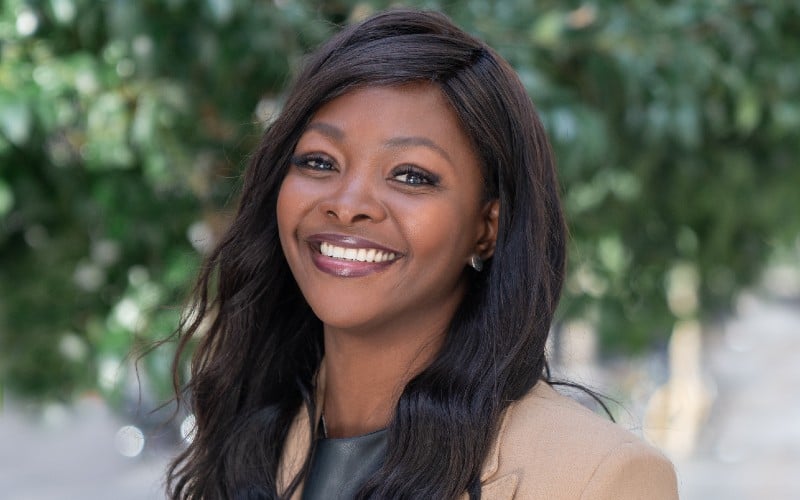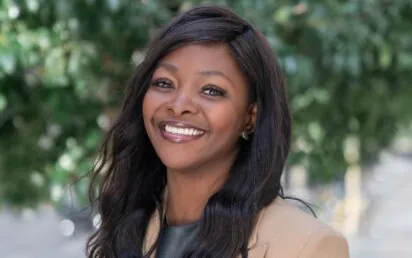Patience Tucker left behind a successful corporate career to join the startup world – and found her vocation with wi-Q.
Tucker, who originally wanted to be a TV presenter, joined FTSE 250 firm CPP Group Plc back in 2008. She quickly rose through the ranks to become the youngest account director at the Leeds insurance business.
“I just flew – I think I was 26 when I landed one of my first big deals, about £5 million, and was sent on a mentoring programme,” she tells BusinessCloud.
“When I left the company, I couldn’t go any higher – I didn’t have MD credentials for another FTSE company at 29!”
Following a stint as head of sales at modular roofing system firm Charcon Roofing Solutions, she joined wi-Q in 2014 as head of partnership solutions.
FinTech 50 star
Seventh on our FinTech 50 ranking last year, the cloud-based mobile ordering solution allows customers to order and pay from a menu of services by simply scanning a QR code, entering a URL or being redirected upon accessing WiFi.
“I met the co-founders Graham [Cornhill] and Stuart [Barnett] and absolutely loved the product! I knew the business was going to fly,” she recalls. “I rolled my sleeves up, working with the three people in the business – all shareholders at that point – to figure out: what is the product? What is the strategy? How is it going to be built? Who are the customers going to be? Which regions will we sell into? How are we going to price it? Everything from the bottom up.”
Tucker, who became global sales director in 2020 then CEO in 2021, says she has never thought about those early years as a training ground for becoming an entrepreneur. “But it was – 1,000%!” she adds.
Verticals
Finding the right verticals for the business was a major challenge. “I was speaking to airlines about how it could work – it’s a very transferable product – but once you go behind a tech stack, it works completely differently,” she explains.
“About a year and a half or two years in, I said: ‘Right guys – we just need to strip it back, let’s find out where our vertical is.’ We chose hotels because it was one of the hardest markets to hit: if we could do it well, we knew that any other player coming in would have the same challenges as we did.
“We did a complete U-turn in terms of our infrastructure: we built a private-facing API; a way to take payments without having to do multiple hard-coded integrations over time; multiple time zones in multiple languages – right to left and left to right, Arabic and Chinese….
“We signed a contract with a major hotel chain and had just started the rollout when COVID hit.”
Three weeks of furlough
Tucker was four months pregnant when the UK entered lockdown and wi-Q, anticipating the complete shutdown of the hospitality industry, furloughed many of its staff.
Within three weeks, almost everyone was back at work. “The hotels knew that when they eventually reopened, they were going to have to do so with no staff and with safe-distancing measures in place – not ideal for handing out menus,” says Tucker.
wi-Q refined its offering and also took the opportunity to build a whole new product set for connecting to home delivery partners. “Rather than having eight tablets in the kitchen, they could integrate everything into our platform and avoid problems such as incorrect order inputs or tablets going offline or crashing.
“Every day for about six months, between the hours of three and five, no one could talk to the head of engineering. That was their time to concentrate on building this.”
Demand for wi-Q’s services has surged following an increased focus on digitalisation in the hospitality sector – accelerated by COVID. However, years of building had left the startup requiring investment, leading to £3m from Praetura Ventures in September 2022.
‘Fail, learn & have fun’: Zuto flourishes in cutting-edge space
VC funding
“When you’ve got VC backing, it’s a different world,” reflects Tucker. “However, you still have to keep that entrepreneurial spirit, and we’re mindful of the fact that the monitoring and legal side of the business has to be on point – this is investors’ money as opposed to our own or angel money.
“We always knew we would become VC-funded at some point, but we wanted to get enough business under our belts so we would get a decent valuation for it. My cap table is full of small angel investors – so even though we’ve been going for the best part of eight years, we are still technically a startup.”
Today the business employs 60 staff, has a seven-strong operational board and is live in 55 countries.
It has a deal with a fast casual business group with 2,500 sites across major chains, as well as a major global hotel company.
“My background is enterprise and that was my deliberate strategy,” says Tucker. “The hotel chain has 7,000 properties and if we only penetrate 15-20% of that, it’s enough to value the business at £40-50m. We’re live in about 200 of their properties already.”
She adds: ““We’ve got a couple of huge deals in the pipeline [while] the US is a big target for us.”
Driven
That corporate high-flyer, a mother of two young boys at age 41, remains as driven to succeed as ever. “I’ve always been very ambitious in my life. Yes, I have an exit plan; and yes, I want a certain lifestyle at some point for me and my family.
“But I want to leave a legacy… if, within our verticals, a brand is looking for mobile ordering and visitor digital engagement, I want wi-Q to be top of their mind. I want to be in that top bracket of solutions.”

